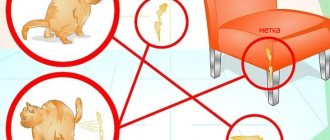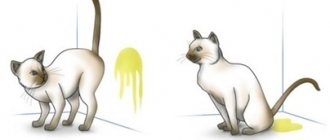Behavioral features
Sometimes, during the process of growth and life, disruptions in the behavior of animals occur. They can be caused both by the influence of the external environment and by individual character traits. It happens that a neutered cat marks its territory not because of the influence of sex hormones, but because of habit or behavioral failures.
The castrated cat was sexually mature
Over time, the sex hormone begins to be produced not only by the testes, but also by other internal secretion organs (adrenal glands, pituitary gland). Thus, removal of the testes does not lead to the cessation of sexual behavior in animals. This problem occurs in cats that have already participated in sexual heat and had contact with cats. In 5% of cases of castration of mature cats, the animal continues to mark its territory.
Problems with the genitourinary system
Diseases of the reproductive and urinary systems lead to malfunction of the body. With cystitis and urolithiasis, the animal begins to urinate frequently in different places. In this case, blood can be seen in the urine, and the cat itself meows pitifully in pain in the process.
Stress
Cats mark territory to scare away rivals and consolidate their leadership positions. It happens that the animal begins to feel insecure. For example, if another cat appears in the house or a move occurs. The male tries to prove that he is the boss in this territory, and he does this with the help of urine and his own smell. In this case, the marks are not associated with sexual behavior.
Can a neutered cat mark territory?
The correct answer is no.
However, here you need to find out 2 things: whether the cat is really neutered and whether he is really marking his territory. It is quite possible that the pet simply has a habit of relieving itself in the wrong place. Signs that a cat is marking territory:
- his urine has a strong unpleasant odor (the main symptom);
- the animal pees mainly on vertical surfaces;
- the pet behaves restlessly, constantly asks to go outside, screams, “demands a cat”;
- the cat's appetite decreases, and he becomes restless, aggressive, scratches furniture (more often, more strongly than usual).
If such signs are observed, then the operation was unsuccessful. It is quite possible that the cat turned out to be cryptorchid, that is, one testicle was not removed, since it was in the abdominal cavity. The surgery will have to be repeated.
Normal urination and marking are two different things. By marking territory, the cat tells the animals that he is the owner of this territory. In addition, the marks attract females. At the time of sexual heat, the pet's urine changes composition due to hormones, its smell becomes extremely unpleasant and strong. Cats also love to leave marks on their owner’s things. Shoes suffer most often, because they have the smell of someone else’s territory, and the pet wants to make them “his own.”
When marking territory, the cat pees exclusively on vertical surfaces. He does this so that the smell spreads further. Also, his instincts tell him that urine is quickly absorbed on the soil, so he needs to defecate on vertical objects. If your pet pees on horizontal surfaces and the smell is weaker than before, then most likely the reason is not the animal’s sexual instinct.
When surgery doesn't help: what to do?
If the owner castrated the cat in the hope of getting rid of the marks, but this did not happen, he should:
- to find their cause, if it is impossible to identify it yourself, you should contact the RosVet VC or a zoopsychologist;
- create a favorable psychological atmosphere in the house for the cat, that is, take into account his desires or dislike for certain people, smells, etc.;
- exclude the dominance of a castrated male over other animals in the house or humans (as a zoopsychologist will tell you);
- Thoroughly wash marks left on objects and use repellents.
You can wean a neutered cat by influencing him psychologically correctly, including by showing him that the person dominates the house. The tags are washed away and treated with the smell of citrus fruits; it is believed that cats do not like it. Foil and other rustling objects can scare away the cat and make him forget about the marks in his favorite corner.
The most effective method is considered to be taking into account all the wishes of the castrato for keeping him in the house. That is, the breeder must create maximum comfort for the animal, including places for food, toilet, sleep, eliminate competition, diseases, etc.
When does a cat stop marking after castration?
After the testes are removed, the habit disappears gradually, so the pet may continue to urinate in inappropriate places. This is usually observed in cases where an adult cat, whose reflex has already been formed, is castrated. If the operation is performed before 6-8 months, then animals do not have this problem.
If the doctor is a professional, he will tell you whether the cat will continue the habit of marking. Typically, an adult animal will recover from conditioning within 4-12 weeks, but it may take longer if the pet is quite old. However, the habit will not remain forever; sooner or later it will gradually become a thing of the past.
To castrate or not: advice from veterinarians
If it happens that a neutered cat marks in an apartment, is it worth considering sterilization at all? Veterinarians at the RosVet VC answer – it’s worth it. Cases where castrates continue to leave their marks are rare, and an unsterilized animal will do this in 100% of cases when it reaches sexual maturity.
To eliminate the possibility of a problem as much as possible, when purchasing a kitten, find out at what time it needs to be castrated, how to provide care and maintenance. Make an appointment at the RosVet CC by phone, 24 hours a day. If necessary, you can call a doctor at home. The clinic is open 24 hours a day.
Why does a neutered cat mark its territory?
A cat may continue to mark its territory after surgery in the following cases:
- Cryptorchidism is a pathology in which one or both testes do not descend into the scrotum, but remain in the pelvic area. Since the temperature in the abdominal cavity is higher, the level of hormones in cryptorchids is much higher. Why do such animals behave aggressively? During surgery, a normal doctor should notice this feature and perform abdominal surgery. But if the veterinarian removed only one testicle, the hormones will continue to be produced, but the cat's behavior will remain the same.
- Little time passed after the operation, which is why the amount of hormones did not have time to decrease. In addition, the animal can maintain the habit for some period even with a decrease in the number of hormones in the blood.
- We operated on an adult pet who had already entered into relationships with cats. If, as a result of the activity of hormones, he has formed a strong habit of marking the boundaries of his personal territory, then it may not disappear for a long time after castration. If the behavior persists for more than six months, the pet should be shown to a veterinarian or animal psychologist.
- Competition for territory with other animals. This is especially true if there is another cat in the apartment. In this case, the habit of marking territory will be stimulated by an external stimulus. As a result, the pet may not get rid of the dishonest reflex for quite a long time.
- Stress. When moving or replacing furniture, your cat may want to make the new environment smell more familiar. Of course, why would he urinate in all corners? In addition, this is a great way to attract the attention of the owner, albeit with a negative sign. Thus, bowel movements in the wrong places during stress are just a measure of psychological protection.
- Change of owner. In this case, the uncertainty of a new relationship is added to the stress. The animal does not understand whether it is necessary to follow the old rules in the current conditions. In particular, will the owner demand that the cat go exclusively to the potty. Of course, the assumption is tested in practice.
- The appearance of a new pet. In this case, competition for the owner's attention arises. The cat may behave aggressively towards its neighbor, become capricious, or get sick. An option to attract attention would be to defecate in different places. In addition, the tags warn the competitor that he is redundant.
- Indifferent attitude of the owner towards the pet. It may seem that cats are too individual and independent to need the attention and affection of their owner. But in reality, they strive for love, just like everyone else. If they don’t get enough of it, they may start doing things in inappropriate places to attract attention.
- Urolithiasis disease. At the same time, stones form in the bladder. Because of which the animal has problems with urination. The pet behaves restlessly, refuses to eat, and constantly tries to pee, but it fails. As a result, due to endless unsuccessful attempts to relieve itself, the animal may begin to defecate in any place.
- Cystitis. As a result of inflammation, the irritability of the bladder walls increases. As a result, the animal is forced to frequently run to the toilet, and this often leads to the fact that the pet begins to defecate before reaching the litter box.
What to do and how to deal with the problem?
If an animal behaves this way due to its emotional state, then it is worth petting it more often.
Just because a method works for one pet does not mean it will work for another cat. For this reason, you need to pay attention to your pet’s health and, if there are additional symptoms, take him to the veterinarian. If a short period of time has passed after castration, then you need to wait a little longer. If the violation does not go away for a long time, then an examination by a specialist is required. In such cases, it is strictly forbidden to scold or apply physical punishment to the cat. When an animal marks, when it is afraid or because of stress, it is recommended to calm it down, pet it and communicate affectionately. Joint games are important to ensure psychological comfort.
If castration was carried out on a cat already at puberty, then owners should know that such an animal can mark longer than younger individuals. When the problem is associated with impaired function of the urinary system, then drug treatment cannot be avoided. To do this, you need to contact a veterinary clinic, where your pet will undergo a full examination and be prescribed therapy. If there are several other representatives of the cat family in the house that have not been neutered, then they can encourage him to behave inappropriately. In this case, there is no need to worry; the problem will soon resolve itself when the cat understands that it does not need to share the territory with anyone.
What to do if after castration the cat continues to mark?
It is not recommended to use physical force. This often only makes the situation worse. If there is a need to punish a pet, you need to declare yourself as the main “male” in the apartment.
To do this you need to proceed as follows:
- Immediately after detecting feces, grab the animal by the scruff of the neck, then lift it to face level.
- Looking him straight in the eyes, you need to hiss, that is, reproduce the sounds that fighting animals make. It may not work right away, you'll have to practice.
- When hissing, you need to hit your pet’s nose with your index finger several times on the left and right (not too hard).
- During the procedure, the cat will hiss, squirm, and close its eyes. When he meows pitifully, release him.
- After the procedure, you need to re-mark the entire area. To do this, you need, firstly, to clean the corners and get rid of the smell, and secondly, wipe the surface with something odorous (socks, T-shirts, perfume will do).
If it is not a matter of habit, you will have to resort to the following actions:
- In case of cryptorchidism, you need to take your pet for re-castration. This time, abdominal surgery will be required, which is much more complex. Therefore, it is undesirable to use an old clinic (even if they offer to do everything for free), since if the doctor there did not notice that the cat is cryptorchid, then this indicates too low qualifications.
- You can reduce the concentration of hormones by reducing the amount of protein foods. Of course, you need to keep your pet on a diet for no more than a month, so as not to cause a deficiency of amino acids and vitamins in him.
- If your cat is marking his territory due to competition, stress or lack of attention, give him valerian or other sedatives. In addition, you need to give your pet more energy, play with it, and pet it.
- In case of urolithiasis or cystitis, the underlying disease is treated. Anti-inflammatory drugs, painkillers, and antibiotics are commonly used. An important element of treatment is the diet, which is prescribed based on the causes of the disease.
If the cause of the marks is the tray
If a castrated cat marks in the house and the reason for this is an improperly organized place for the toilet, the breeder will have to reconsider his views and give the cat a priority place. Things to consider when choosing a tray:
- it is selected according to size, the animal must fit there freely;
- The tray must not be placed near the feeding area;
- cats are shy and want to do things away from everyone, so the toilet is placed in secluded corners. Ideally covered trays;
- wash the tray after each visit, if it is without filler, and remove clumping fractions 2-3 times a day. If there is a smell, the pet will not go there.
When the reason “tray” is excluded, and the cat continues to make marks, it is necessary to consider other factors. The owner himself must find a compromise in his relationship with his pet, and not expect him to adapt to him.
It is important to know! It is strictly forbidden to beat the animal, poke its nose into its marks, or influence it in any other harsh psychological or physical way. As a result, the cat will “begin to take revenge” by marking its territory in the hope of protecting itself from aggression from humans.
Stress factor
Your cat is sterilized and marks corners in the apartment. How is that? The indignation of the owners is understandable; it is simply impossible to tolerate the disgusting smell. Do you really have to get rid of the animal if nothing helps?
Wait. Let's try to understand the problem. Remember, was there a situation at home that could affect the cat? Maybe friends with a dog came to visit? Or did little guests come to the children who wanted to meet the beautiful purr? Or did your pet’s food suddenly change?
It would seem that these are very minor factors. This is real stress for you and me, but for the cat. Imagine, she lies there, not bothering anyone. And then a dog’s face came out of nowhere. And he smiles from the top of his dog’s mouth. Naturally, the cat’s eyes will widen, as they say, and it will start looking for the fifth corner in the apartment, just to escape from the monster. And then the body “discharges” in such a non-standard way as marking the territory. Because he was stressed.
Nerves
Cats also have nerves, and under some circumstances they can’t stand it. If people try to treat their nervous breakdowns with pills or alcohol, then cats do it differently - they mark. What can cause stress in a cat is sometimes the owners moving from one apartment to another.
Sometimes this is a nervous situation in the family; many animals sense when the mistress or owner is in a bad mood.
In this case, treat the cat as a sick family member, try to prevent him from receiving additional mental trauma. If you do this, the animal will quickly calm down and stop marking.
What could be the downsides?
In fact, there is only one that can be singled out. This is the inability to reproduce. If you have a breeding cat who is a winner of exhibitions and championships, then you should look for another solution to the problem. For example, you can move to a private house, where he will have a walking area. Frequent matings can be a solution to the problem, but usually the owners cannot find him as many partners as required. As an option, some owners sew an artificial mug, which will serve as an object for excessive sexual activity.
New people
In the eyes of a cat, everyone who moves can become his rivals, not only animals, but also people. Therefore, if a new person appears in your family, no matter where he came from or how old he is, the cat will see him as someone who is encroaching on his freedom. You can't change the cat, it's all at the genetic level, so just be patient. The cat himself will eventually understand that no one is challenging his supreme power and will calm down.
Accompanying symptoms
When an unpleasant odor of urine appears that differs from the usual one, the following symptoms are most often observed:
- When overheated, a cat breathes with its mouth open, like a dog, which is completely unusual for these creatures.
- A dry nose, hot ears, and changes in the condition of the mucous membranes also indicate dehydration.
- The release of sex hormones during the rut is accompanied by typical signs: the male cat is restless, has dilated pupils, screams, rubs against various objects, often tries to escape from the house, and is especially active at night.
- If there is a malnutrition, not only an unpleasant smell of urine often occurs, but also a stench appears from the cat’s mouth, and obesity, problems with stool, untidiness and lethargy also develop.
- Diseases of the kidneys and urinary system are accompanied by pain and pain when urinating, urine dripping, frequent visits to the toilet, increased thirst, inflammation of the external genital organs, and in severe cases, apathy and loss of appetite.
- Tumors and endocrine disorders may not manifest themselves externally for a long time. Diabetes can be accompanied by severe thirst, obesity, and then sudden weight loss; with tumors, the behavior of the animal changes, and nausea and vomiting may appear.
- When stressed, a cat tries to hide under the bed, sofa, closet, or any secluded place. Her eyes are wide and she may shake or curl into a ball.
An attentive owner will immediately notice the signs of danger and take the pet to a veterinary hospital.
Animal disease
It is quite possible that the cat has problems with the gastrointestinal tract (GIT), and there may also be problems with the urinary system. The cat associates his pain with going to the litter box. It is because of this that the cat can walk past the tray. In such cases, consultation with a knowledgeable veterinarian is necessary. It is difficult to find a good veterinarian; usually it is only word of mouth, advice from friends. But if you managed to find a professional, you are lucky.
If you act correctly and on time, you will definitely cope with this problem. Always remember that this is one of your family members, so be patient and loving.
The veterinarian talks about castration of cats, sterilization of cats, marks, and diseases - a detailed, thorough video.
The cat began to shit. Why did the cat start shitting? Main reasons and what to do?
Let's summarize
We talked about why a cat marks. Main conclusions of the article:
- The reasons for this phenomenon are different. These include: bladder problems, estrus, stress, change of environment, the arrival of a new family member.
- How to deal with hooliganism? First of all, find out the reason, and if it is not associated with diseases, then there are several options: sterilizing the cat, cleaning with special products that wean the pet off from marking, cleaning the area using available disinfectants. They kill the smell and repel the cat with their own scent.
Optimal age
In fact, everything is individual. Therefore, in order to answer the question of whether cats mark after castration, you will have to observe a specific pet. Until about six months, the kitten’s reproductive system has not fully formed, so it is absolutely impossible to operate on it. The best age for this is considered to be from 7-8 months to a year. If you managed to complete it before the first signs of a crime or mating appeared, then the question of whether cats mark after castration will be clearly negative. There is a 99% chance that you will never have to deal with such a phenomenon in your life.











